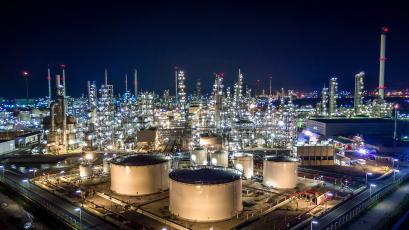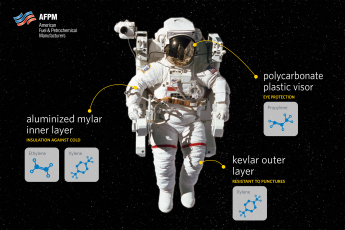Election Day 2016 in the U.S. is almost here, and the anticipation is building as this important day nears. On November 8, Americans will go to the polls to vote for a new President, members of Congress, and state and local officials. We have seen in recent weeks more promotions for each of the candidates – yard signs, stickers, commercials and debates on TV. But have you ever stopped to think about the important role that petrochemicals play in the election? As you drive through your neighborhood you’ll see many colorful yard signs for various candidates.
The yard signs are usually made from polyethylene (created from the petrochemical ethylene) that is suitable for indoor or outdoor use. This durable material is ideal as it resists cracking, peeling and chipping, even in cold weather climates. You’ll also encounter people wearing stickers promoting their candidate of choice. The stickers are often created from vinyl, also known as polyvinyl chloride, that is derived from ethylene as a starting material. On TV you’ll see various ads for the candidates as well as regularly scheduled debates between our Presidential contenders.
TVs utilize a range of petrochemical-based products including:
- Acrylonitrile Butadiene Styrene or ABS (made from the petrochemicals propylene, benzene and butadiene as starting materials) for TV housings
- Polycarbonate (derived from the petrochemical benzene) for diffusion panels in large-size liquid-crystal-display (LCD) monitors and TVs with direct backlights.
- A combination of ABS and thermoplastic polyurethanes (derived from propylene) or other rubbery elastomers to make up the TV remote.
On the big day itself, you will cast your vote using the voting machine at your local precinct. The raw materials for the direct recording electronic voting machine include a range of petrochemical-based plastics such as ethylene, propylene, butadiene, and styrene. Components made from these petrochemicals as a starting material include printed computer circuit boards, control panels, printers, and memory cartridges. In addition, the case that houses the workings of the voting machine can be made from ABS or other lightweight plastics.
At some polling stations, a privacy screen made from corrugated plastic (made from propylene as a starting material) is utilized to guarantee privacy as voters cast their votes. Election Day provides yet another example of the key role that petrochemicals play in our daily lives. On this very important Election Day, make sure your voice is heard – get out and vote!


